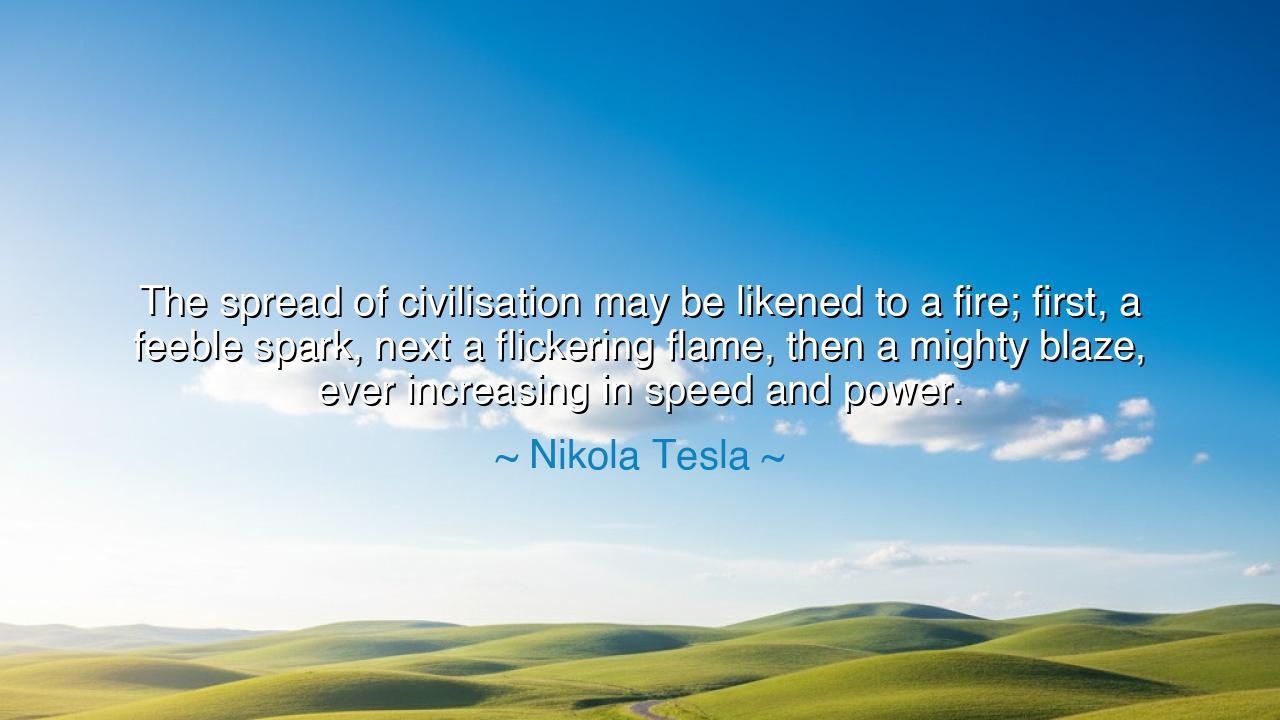
The spread of civilisation may be likened to a fire; first, a
The spread of civilisation may be likened to a fire; first, a feeble spark, next a flickering flame, then a mighty blaze, ever increasing in speed and power.






Nikola Tesla, seer of electricity and dreamer of worlds yet unborn, declared: “The spread of civilisation may be likened to a fire; first, a feeble spark, next a flickering flame, then a mighty blaze, ever increasing in speed and power.” In this vision, he captures the essence of human progress—fragile in its beginning, uncertain in its rise, and unstoppable in its triumph. For civilisation, like fire, begins in weakness but grows into a force that shapes the destiny of nations.
The meaning is radiant and fierce. A spark is but a whisper of heat, easily extinguished by wind or carelessness. Yet if tended with patience, it becomes a flame, warming and guiding. In time, it surges into a blaze, unstoppable, spreading across fields and forests. So too with civilisation: from humble beginnings in huts and villages, it grew to cities, then to empires, and at last to a global order blazing with knowledge, invention, and power. What begins small, if guarded and fed, becomes mighty.
History confirms this parable. Consider the Renaissance. It began as a fragile spark in Florence, a small circle of thinkers reviving the wisdom of Greece and Rome. At first, it flickered uncertainly, resisted by old powers. But soon the flame grew—art, science, and philosophy spread across Europe. And in time, the blaze of discovery transformed the entire world, ushering in revolutions of thought and invention that no king or priest could extinguish.
Tesla himself embodied this truth. He, born in obscurity, carried within him a spark—the vision of a world connected by invisible currents. Alone, misunderstood, mocked at times, his ideas flickered against the winds of doubt. Yet from his spark came the flame of alternating current, wireless transmission, and technologies that set the blaze of modern civilisation alight. His words were not poetry only, but testimony born of his own life.
Therefore, let the seeker of wisdom remember: every great advance begins as a spark, fragile and overlooked. Do not despise small beginnings, nor doubt the flickering flame. For in time, with patience, courage, and vision, it becomes a mighty blaze, unstoppable, transforming darkness into light. Tesla’s words stand as prophecy and counsel—that the power of civilisation, like fire, will grow, and with it the duty to wield its heat not for destruction, but for the illumination of all humankind.






NNampayacc
I find this analogy fascinating because it perfectly captures humanity’s restless energy. The spread of civilization mirrors the physics of fire—self-propagating and dependent on constant fuel. But it raises a question: what happens when there’s nothing left to burn? Can progress continue indefinitely, or must it eventually collapse under its own intensity? Tesla’s metaphor feels timeless, urging us to think about how we direct the flames of our own making.
NPNhi Pham
This statement makes me think about the dual nature of progress—how it starts small but quickly becomes unstoppable. The idea of civilization spreading like fire evokes both beauty and danger. I wonder if Tesla, as a visionary inventor, saw the world’s rapid industrialization as both thrilling and perilous. Could he have foreseen that the same drive that fuels advancement might also threaten our environment and social balance?
SSakura
I love how vivid this metaphor is. It shows civilization as something alive, growing from fragility to immense strength. But it also makes me think about sustainability. Can a blaze that ‘ever increases in speed and power’ keep burning forever without exhausting its fuel? Perhaps Tesla’s words reflect both admiration for human ingenuity and concern that progress, without wisdom, could consume the very foundations that sustain it.
NH31. 6/9 Dang Thi Thao Nhi HVN
This image of civilization as fire is powerful—it captures both creation and destruction. Fire gives warmth and light, but it also consumes. I wonder if Tesla intended a warning here. As human progress accelerates, does it inevitably risk burning out of control? It feels like a metaphor for technological advancement too—what begins as innovation can become domination if we lose sight of balance and moral restraint.